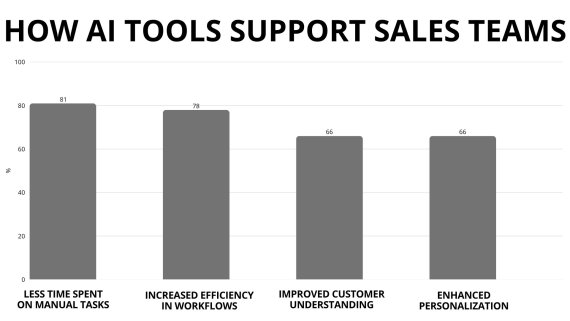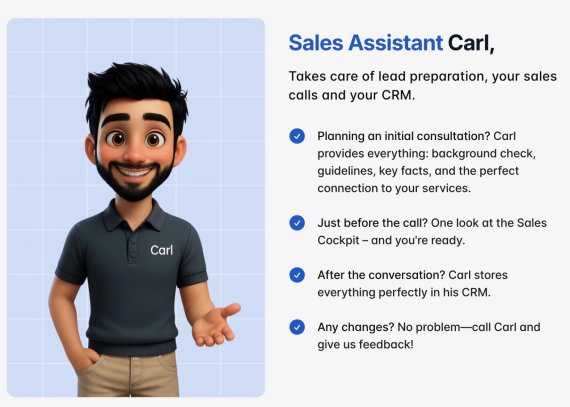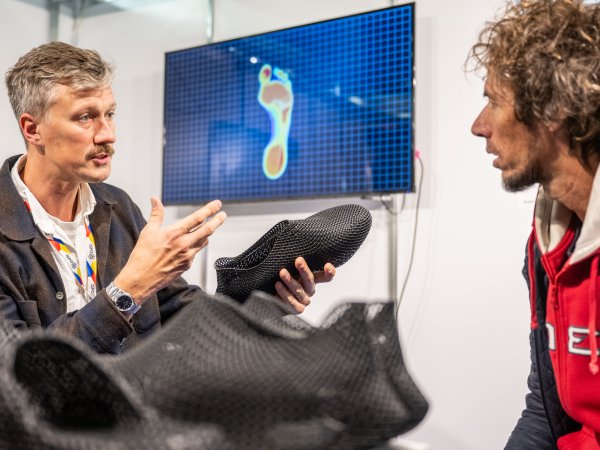This is the fourth stage of interaction with artificial intelligence. If we started by talking to a large language model, then later prompted it specifically, at some point automated it (using tools such as make.com or n8n.com), the first autonomous AI employees are now available.
And there will be more every day. A more than likely scene from the future world of work: sooner or later, each and every one of us will be working with at least one AI colleague. At least that is one conclusion that can be drawn from the Microsoft Work Trend Index 2025 study follows. Because it shows:
- Digital workers are coming: Three out of four German managers plan to integrate AI agents into their company by the end of 2026.
- Many will manage agents: Just under 40% of managers* expect their employees to create, delegate and manage AI agents by 2030.
- AI pioneers are more optimistic: In companies that already use AI, around 70% of employees have a positive view of their economic situation - compared to 35% in other European companies.
An example from the sales sector shows how automation or agents can help: according to a study by HubSpot (2024) sales colleagues only use a third of their time to do the core of their work: selling a product. Those who use AI tools to offload administrative tasks can save two hours a day or use them "to connect with customers, build relationships, advance the pipeline and, of course, close more deals", as the authors write.
Dominic teaches skills. Since the end of 2023, his online academy has been offering part-time education and training on the use and application of AI. Leaders of AI will soon be expanding its existing Master of Business with AI (MBAI) offering to include a program on AI agents: Those who become AI Integration Specialists there should be able to integrate multi-agent systems into companies without a line of code. Its participants come from all industries.
But agents also need onboarding. Dominic von Proeck, founder of Leaders of AI, explains:
'The most exciting thing is to fine-tune an agent until it can become a serious member of your team.

Dominic von Proeck: We have a geopolitically tense situation and at the same time a rampant shortage of skilled workers. The departure of the baby boomers alone will result in a shortage of around seven million workers in Germany over the next five years. Anyone who starts working with AI assistants will be given management tasks. I have to formulate work assignments, develop a vision, correct mistakes. That's always leadership, whether in sales, accounting or marketing.
Our target is for each person to be responsible for a turnover of 1.5 million euros. Today, we have 32 AI colleagues working for us. Fred has access to my emails; he writes the first versions of replies, Lea secures internal knowledge, Jürgen is our head of content marketing and Helga recruits new agents.

How appreciatively and purposefully the AIs interact. We have introduced agents who guide other AIs. Jürgen distributes tasks or feedback at eye level in a way that would improve any management seminar. The second thing that is new for us is that we have developed our own assessment center for AI recruiter Helga. New AI assistants undergo tests there. They are hacked 1000 times by other AIs: How secure are they, how well can they really do a certain task?
We have established that transformation comes from within. That's why you first learn to build teams of AI assistants yourself. You understand how automation works, how to brief AI assistants and can better assess service providers. Many people are learning to think operationally again. That changes your perspective.
Then find out how ISPO brings together all the players in the sports industry and creates space in which real ideas and innovations for the sports industry are created.
For example, you learn how to set up and brief Fred. He is an agent who prepares customer appointments, creates discussion guidelines, maintains the CRM and triggers follow-ups. The most exciting thing is to fine-tune Fred over time until he can become a serious member of your team. Feedback discussions help with this, just like with people. And by making implicit knowledge explicit. For example, through guidelines or clear process definitions.
Yes, Helga now does 70% of the prompt work. But you still need to understand whether what she does makes sense. The role is shifting towards supervision.
We are seeing a rapid development in sales and marketing topics. Someone has created a highly personalized newsletter. Each recipient is addressed individually. Instead of sending an email to 10,000 people, there are now 10,000 different ones. And the AI is learning, constantly updating its knowledge about its recipients. This is the latest standard.
The management must first position itself clearly. If their attitude towards AI is positive, give everyone the certainty in step two: We won't make anyone redundant. Finally, I would start with the employees who are keen on the topic, not necessarily just in IT, but above all in the specialist departments. These multipliers then build up an internal community that defines together: What can and should AI do for us and what not.
Then become an exhibitor at ISPO 2025 and present your product or service to an international audience at the flagship event of the global sports industry.
The Leaders Lab is our research department. In the age of AI, you need to bring together different areas of expertise because the field is developing so rapidly. That's why we invented this lab with Microsoft, Ernst&Young and Virtual Identity. The danger is that it remains just prototypes. However, we ourselves use many of the findings from these events.
Marketing-Jürgen originates from the hackathon on multi-agent systems. There, we determined that such systems offer potential in content marketing in particular: Agents generate target group-specific content in real time, analyze moods and orchestrate cross-channel brand messages. And the question that occupied us the most in the newsletter hackathon: What comes after hyper-personalization?
One AI employee per department: this is the vision of Niclas Barthélemy, founder of Scoreprise.ai. "We support companies in the integration of AI and create AI employees." An example from sales: the start-up develops and hires digital colleagues who take over processes independently: They research leads, prepare initial meetings and maintain the CRM. The monthly license per AI head: 950 euros. Scoreprise calls its AI sales professional Carl. Niclas explains: "Our AI Carl researches leads, prepares initial meetings, anticipates objections and suggests suitable responses."

Niclas Barthélemy: He can research new brands in a targeted manner, tailored to existing partners, price ranges and target groups. He scours websites, Instagram profiles, trade registers and marketplaces. For example, Carl could look for brands for a sneaker store that have recently announced expansions in Europe, perhaps via influencer campaigns in the DACH region. He prioritizes his suggestions and passes them on to the person.
Carl scans publicly accessible data sources, e.g. website source texts, company registers, LinkedIn via specially configured scrapers. He prioritizes the hits according to factors defined with the customer, such as company size, industry, language on the website. Carl extracts contact persons from the data and also formulates individual initial approaches, anticipates objections and suggests suitable responses, including a tone of voice that matches the target person's communication style.

Possible tools include internal customer CRM systems and sales tools, research via scrapers on the internet, LinkedIn and other platforms. Carl works in an agile way: he is not a hard automation, but decides autonomously which tool he should use for the task at hand.
One example is the Hearthunting agency, which specializes in recruiting personnel for logistics companies. Carl regularly analyzes which companies are actively looking for drivers on StepStone or Indeed, a clear indication of an acute need for personnel. This used to be manual work: employees clicked through search portals to identify potential customers. Today, Carl takes over this research. That saves a lot of time.
We start with a workshop on target group analysis, the so-called ICP (Ideal Customer Profile). Each customer receives a sales cockpit in which he or she can transparently track Carl's tasks and results. For example, Carl can simulate different conversation starters or generate his own "battle cards" for frequent objections. In the retail adaptation, this could mean: "How do I position a favorable new brand compared to my existing brand XY?"

Wherever internal processes are unclear. Carl cannot act effectively without a defined CRM system, role allocation and workflows. An example: A customer had no system for following up on leads. All of Carl's research work came to nothing because no responsibility was assigned within the team. Another customer did not yet have any guidelines for their sales inquiries.
Not everyone has the right infrastructure for Carl to start work. He also has to familiarize himself with the company. It usually takes a month for him to start working effectively. During this onboarding phase, Carl learns the necessary knowledge and processes. We also offer an AI partner program: We start with an AI potential analysis, which leads into a roadmap for AI integration, and then stand by the company as "COO for AI" to implement the AI potential.
One thing is clear: artificial intelligence offers far-reaching opportunities for the sports industry. ISPO 2025 offers sowohol the ideal opportunity to discover further trends and innovations from the sports tech sector and to present them to an international audience. Be there when start-ups, technology providers, brands, retailers and decision-makers discuss the future of tomorrow. From 30. NOV. - 02. DEZ. in Munich.
- Introducing AI means leading AI: Anyone who works with AI agents automatically assumes leadership responsibility, whether in marketing, sales or on the shop floor. Agents need clear goals, feedback and ongoing training.
- AI does not replace, but relieves: Sales agents analyze customers, create conversation guidelines and maintain CRMs so that salespeople can focus on real contact.
- Every AI start starts small: Choose employees interested in AI, build the first agents in clearly defined processes and let them grow. This creates expertise that can be scaled."
- ISPO awards
- Mountain sports
- Bike
- Design
- Retail
- Fitness
- Health
- ISPO Job Market
- ISPO Munich
- ISPO Shanghai
- Running
- Brands
- Sustainability
- Olympia
- OutDoor
- Promotion
- Sports Business
- ISPO Textrends
- Triathlon
- Water sports
- Winter sports
- eSports
- SportsTech
- OutDoor by ISPO
- Heroes
- Transformation
- Sport Fashion
- Urban Culture
- Challenges of a CEO
- Trade fairs
- Sports
- Find the Balance
- Product reviews
- Newsletter Exclusive Area
- Magazine




